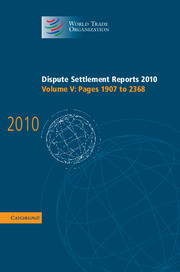Australia – Measures Affecting the Importation of Apples from New Zealand (WT/DS367)
Published online by Cambridge University Press: 13 December 2017
Summary
INTRODUCTION
1. Australia and New Zealand each appeals certain issues of law and legal interpretations developed in the Panel Report, Australia – Measures Affecting the Importation of Apples from New Zealand (the “Panel Report”). The Panel was established on 21 January 2008 to consider a complaint by New Zealand concerning several Australian measures on the importation of apples from New Zealand.
2. Following a request for access to the Australian market filed by New Zealand in January 1999, the Australian Quarantine and Inspection Service (“AQIS”) initiated an import risk analysis to assess the risks associated with the importation of apples from New Zealand, including, notably, the risks associated with the following three quarantine pests: fire blight, European canker, and apple leafcurling midge (“ALCM”). In November 2006, Biosecurity Australia issued its Final Import Risk Analysis Report for Apples from New Zealand (the “IRA”). This risk assessment was “semi-quantitative” in that, for each pest, it combined a quantitative assessment of the likelihood of entry, establishment and spread with a qualitative assessment of the likely associated potential biological and economic consequences. The combination of these probability assessments then yielded an overall determination of “unrestricted risk”, that is, the risk associated with the importation of apples from New Zealand in the absence of any risk management measures.
- Type
- Chapter
- Information
- Dispute Settlement Reports 2010 , pp. 2175 - 2346Publisher: Cambridge University PressPrint publication year: 2011
- 8
- Cited by

